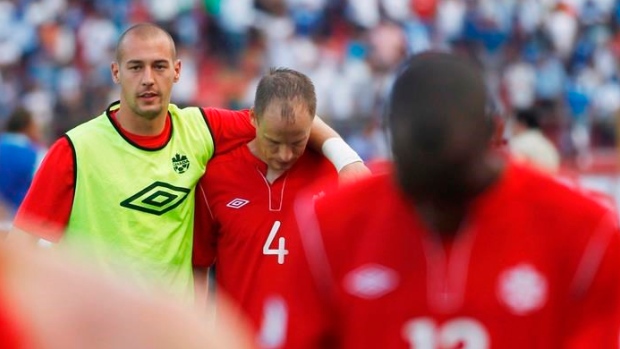Sep 9, 2016
Tough times demand tough decisions
After yet another early exit from World Cup qualifying, Noel Butler writes that it is time for the Canadian Soccer association to make some tough decisions.
By Noel Butler

Much like four years ago during this very same stage in the qualification cycle, it was Honduras who put the final nail in Canada’s World Cup coffin. That proved to be the impetus for the hiring of the ex-manager of Real Madrid, Benito Floro, to take over the reins for Canada.
It was clearly spelled out at the time by then Canadian Soccer association president and current president of CONCACAF, Victor Montagliani:
“The first objective is obviously to get us to the Hex,” he said Montagliani. “You can't get into the World Cup if you don't get into the Hex.”
The Hex is the final round of CONCACAF qualification, something Canadian soccer fans haven’t experienced since our only taste of a World Cup Finals way back at Mexico 1986.
Having travelled to Spain in September 2013 for their first camp under Floro, the men’s national team then moved on to London for a 10-day camp that culminated in a debut match under their new head coach against Australia.
On that night, most of the media were still staring at their laptops when Australia took the lead with less than a minute on the clock.
Australia would score two more goals, but could have had five more, while Canada was held off the score sheet. This was an Australian team that had fired its head coach less than a week before the match, the same coach who had successfully navigated Australia through Brazil 2014 qualification. This within itself speaks volumes to Australia’s long-term strong will and desire for continual self-improvement on the soccer pitch.
The most rigid analysis and thorough research was called for after Australia’s 2002 World Cup qualification campaign, which ended after they were overcome by Uruguay in the playoffs. Added to this were mismanagement and corruption claims within Soccer Australia.
Published in 2003, the Crawford Report called for a complete root-and-branch overhaul of soccer right across Australia. Multi-millionaire Australian businessman Frank Lowy, in his role as the chairman of the Australian Football Federation at the time, quite literally dragged Australia from the soccer abyss into the 21st century.
Australia, like Canada, has numerous sports that garner national and international success on a scale not imaginable for the beautiful game in either nation’s case. Yes, they play in the much weaker FIFA Continental football body, yet Australia has qualified for four previous World Cup Finals.
With seven victories in their eight matches ahead of the AFC’s final qualification cycle, Australia are well on their way to qualifying for a fifth. At Germany 2006, the Socceroo’s came within a whisker of upsetting Italy in the Round of 16 before the Azzurri went on to claim the World Cup. Meanwhile, Canada continues along its backward pathway.
During his tenure, Floro successfully plugged Canada’s leaky defence to the point the national team set a record in 2015 by conceding less than a goal every other game; however that was negated by the team’s inability to find the back of the net.
Going over a year without scoring a single goal and only managing a meagre two goals through five matches until notching three against El Salvador this past Tuesday night, Canada’s exploits in front of goal under Floro have become as rare as an England team not underperforming at a World Cup Finals.
When asked about his fondest memories with Real Madrid at his 2013 unveiling, the 64-year-old Spaniard stated: “The best was when we beat Barcelona, playing well.”
In his three-plus years with Canada, Floro has failed to get his charges playing well for any period of time, let alone an extended period.
Qualifying automatically for the only Gold Cup under Floro makes as suspect reading as it gets. Co-hosting along with the U.S. and Mexico, Canada failed to score a single goal and finished bottom of the group with two points in three matches. Making the soccer wound deeper was the fact Costa Rica qualified for the knockout stages by virtue of three draws in their matches.
I’m not advocating the CSA simply jettison Floro; that would be too easy. The Canadian Soccer Association needs to take this opportunity to finally implement its own version of Australia’s Crawford Report.
Although the national team has managed to rise a few places in the international rankings under Floro — currently sitting at 100 in FIFA’s ranking system — it is totally unacceptable that we are not much further up the rankings.
It is time to think outside the box. Our committee needs to be made up of not just soccer people. It has been one failure heaped upon the next for the men’s team since winning the Gold Cup in 2000. A perfect candidate for the committee is Canada’s captain at the time, none other than the recently appointed director of development for the CSA, Jason de Vos.
Also include John Herdman and his captain, Christine Sinclair. The remainder should be from outside Canada’s inner soccer sanctuary. Hockey Canada should be represented, as should some of our smartest business people. Senior executives from the professional club ranks should form the nucleus of the sub-committee.
It would be foolhardy to give Herdman a hands-on, day-to-day role within the MNT coaching and technical structure. The opportunity cost of that would be London and Rio’s bronze medalists.
The CSA’s commercial success has grown leaps and bounds since Floro was appointed. Although still very much a developing soccer nation, we’ve never been as capital, soccer resource and infrastructure rich.
However, our men’s national team is bankrupt. It’s time to call in the liquidators.
